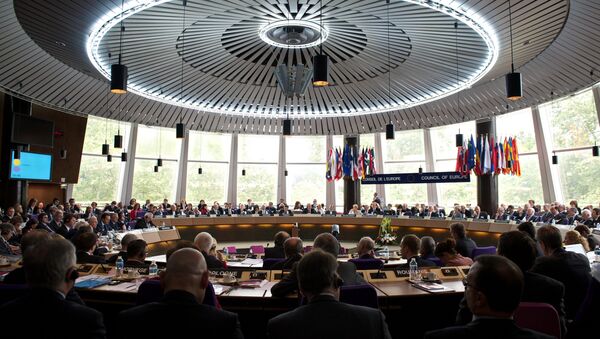The European Court of Human Rights ruled on Tuesday that the Russian authorities had violated the rights of the now-defunct Yukos company, but rejected claims that the break-up of the oil giant was politically motivated.
The split decision was welcomed by both sides.
The court also deferred consideration of a Yukos claim for $98 billion in compensation, giving the parties three months to reach an out-of-court settlement. The claim was the biggest ever filed at the court.
Politics or white-collar crime?
Lawyers for Yukos, which once pumped out more oil than both Libya and Qatar, had said that the company was hounded out of business after its owner Mikhail Khodorkovsky - then Russia’s richest man - began funding the Russian opposition. The Kremlin has consistently denied the allegation.
Yukos first became the subject of tax proceedings in 2002, when tax authorities accused it of setting up shell companies to hide earnings. It was declared insolvent in 2006 and was liquidated the following year. Its vast assets were acquired by the state-run Rosneft oil company.
Khodorkovsky was arrested in 2003 on tax evasion charges and sentenced to eight years in 2005. His sentence was extended in a second trial on separate charges earlier this year and he is now due for release in 2016. Prime Minister Vladimir Putin, who was president at the time of the break-up of Yukos, said “a thief belongs in jail” before the start of Khodorkovsky’s second trial.
The ruling
In its ruling on Tuesday, the court said the Russian authorities had carried out "legitimate actions... to counter the company's tax evasion”.
The judges also ruled that "There was no violation of Article 14 [prohibition of discrimination]… concerning whether Yukos was treated differently from other companies.”
But it also ruled that Russian officials had failed to give the company enough time to prepare its defense and had violated the company’s property rights.
The court also said its ruling was not final and was open to appeal.
Russian authorities’ reaction
Mikhail Barshchevsky, the Kremlin representative at Russian high courts, said the court’s dismissal of the political motivation allegations was an "indisputable victory".
“The European Court of Human Rights conclusion that there is no political subtext in the Yukos case is an unquestionable victory for Russia’s representatives in the court,” he said.
Russia’s Justice Ministry also hailed the decision, saying in a statement that the court had acknowledged that Yukos “had a complicated plan for minimizing their taxes, which envisaged fraudulent use of numerous front companies, registered in Russian tax havens.”
"The charges of selective and individual persecution have not been confirmed," the Justice Ministry added.
Yukos reaction
Khodorkovsky’s lawyers welcomed the court’s “findings that the Russian government violated the right to a fair trial and property rights while handling the Yukos case.”
Yukos's former chief financial officer, Bruce Misamore, also claimed victory.
"The European Court of Human Rights confirmed that the Russian tax proceedings were unfair, finding that the limited period given to Yukos to have access to the case material was ridiculously short, however many lawyers Yukos might have been able to deploy," he said in an online press conference.
"The points of our filing that the European Court of Human Rights has ruled in favor of are very, very significant,” he added. “The court has vindicated Yukos' position.”
Steven Theede, former chief executive officer of Yukos Oil Company said the court found “the crux of the case was the speed with which the Russian authorities demanded that Yukos pay the taxes, despite the fact its assets were frozen, and the decision to choose to 'auction' OAO Yuganskneftegaz, its main production unit, to meet the asserted liabilities.”
In Russia
Reaction to the ruling was mixed within Russia.
Nikolai Kovalyov, a member of the ruling United Russia party and a former Federal Security Service (FSB) director, said Yukos had committed a crime, and disagreed with the court’s ruling that the company’s right to a fair trial had been violated.
“Here in fact is an element of politicization - pick on Russia any which way,” he said.
Lyudmila Alexeyeva, the head of the Moscow Helsinki Group, a human rights body, told RIA Novosti she hoped the second court ruling would be "in Yukos’ favor."
"To me, it's evident the case was politically motivated. Yukos paid its taxes honestly," she said.
State Duma International Affairs Committee Chairman Konstantin Kosachyov said cases “should be legally perfect and watertight” or they ran the risk of speculation about a “political subtext, which is precisely what happened in the Yukos case.”


